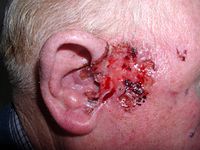
Photo from wikipedia
Chemotherapy has been validated unavailable for treatment of renal cell carcinoma (RCC) in clinic due to its intrinsic drug resistance. Sensitization of chemo-drug response plays a crucial role in RCC… Click to show full abstract
Chemotherapy has been validated unavailable for treatment of renal cell carcinoma (RCC) in clinic due to its intrinsic drug resistance. Sensitization of chemo-drug response plays a crucial role in RCC treatment and increase of patient survival. Herein, a recognition-reaction-aggregation (RRA) cascaded strategy is utilized to in situ construct peptide-based superstructures on the renal cancer cell membrane, enabling specifically perturbing the permeability of cell membranes and enhancing chemo-drug sensitivity in vitro and in vivo. First, P1-DBCO can specifically recognize renal cancer cells by targeting carbonic anhydrase IX. Subsequently, P2-N3 is introduced and efficiently reacts with P1-DBCO to form a peptide P3, which exhibits enhanced hydrophobicity and simultaneously aggregates into a superstructure. Interestingly, the superstructure retains on the cell membrane and perturbs its integrity/permeability, allowing more doxorubicin (DOX) uptaken by renal cancer cells. Owing to this increased influx, the IC50 is significantly reduced by nearly 3.5-fold compared with that treated with free DOX. Finally, RRA strategy significantly inhibits the tumor growth of xenografted mice with a 3.2-fold enhanced inhibition rate compared with that treated with free DOX. In summary, this newly developed RRA strategy will open a new avenue for chemically engineering cell membranes with diverse biomedical applications.
Journal Title: Advanced materials
Year Published: 2019
Link to full text (if available)
Share on Social Media: Sign Up to like & get
recommendations!